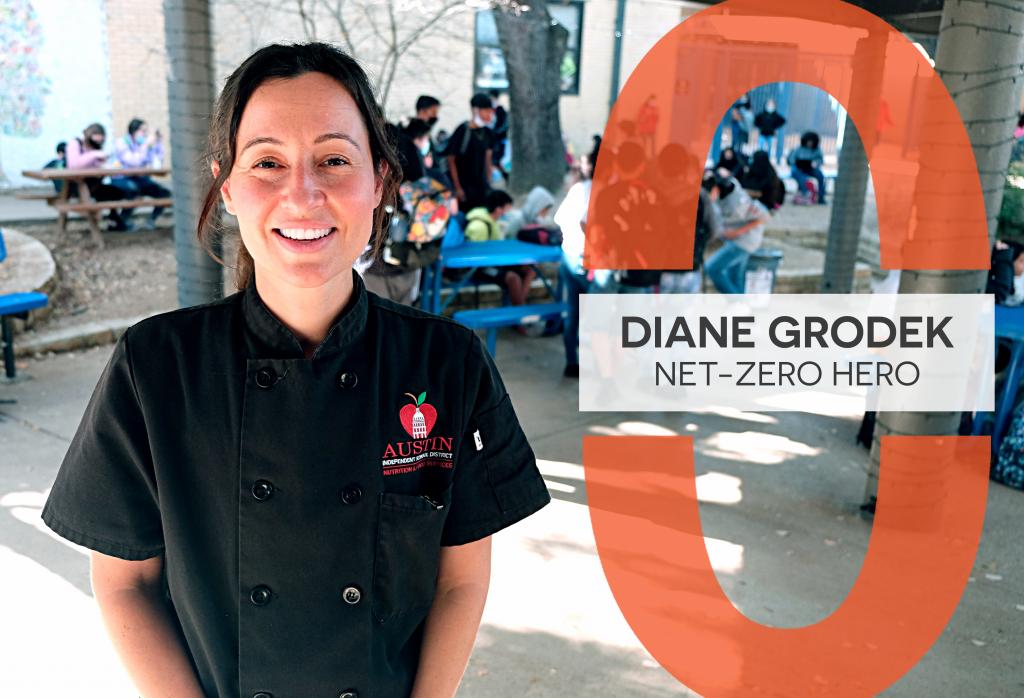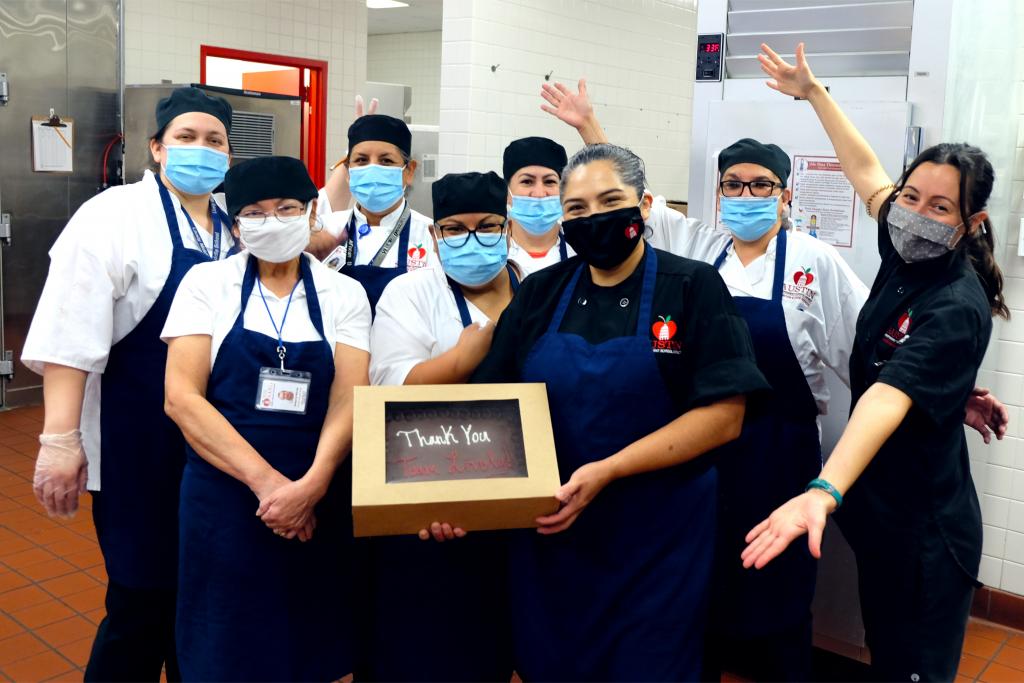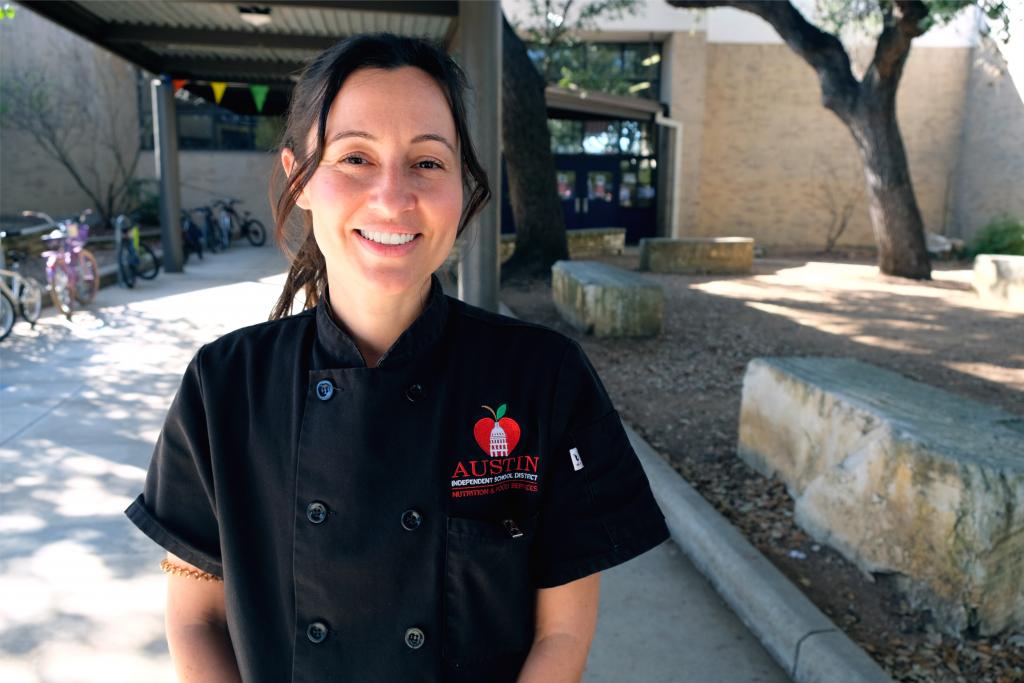Net-Zero Hero: Diane Grodek

I’m helping to make Austin net-zero by ensuring AISD Food Service considers sustainability in every decision we make — from cafeterias to procurement, recipes to menus, and catering to concessions.
Meet Diane Grodek, our newest Net-Zero Hero! As Executive Chef with the Austin Independent School District (AISD), Diane influences the health and eating habits of more than 74,000 Austinites! From embracing the Good Food Purchasing Program to supporting schoolyard gardens, Diane has centered sustainability in all of her work. Her efforts are helping to bring a healthy and just local food system to AISD and the city at large.
We met with Diane at Lively Middle School to talk about food programs at the district, her passion for sustainability, and tips she has to help all of us be a bit more green every day!
What inspired you to take action?
In the sixth grade, I had an inspirational teacher who started an Environmental Awareness Club, and I was the first President! This was in the ‘90s, so our main goal was to teach “reduce, reuse, recycle” slogans to our classmates. Ever since then, I have had an interest in sustainability. As the world becomes a warmer, more plastic-filled place, my interest in sustainable practices continues to intensify.
How did you do it?
I started working for AISD six years ago as a Cafe Manager. During my first year, I collaborated with my director to see how the garden at my school could safely serve the veggies grown there to the students coming through the lunch line. With that small goal in mind, we started the official Garden to Café program!

Left: A photo of vegetables growing in the school garden at Lively Middle School. Right: Diane stands outside the garden.
Soon after, I was asked to start a Catering program for the district. It was important to me to make that sustainable as well. I didn’t want to be another caterer using single-use aluminum trays and disposable bowls that get wrapped up in a plastic tablecloth and thrown in the trash at the end of lunch. I purchased durable, reusable serving containers, chafing dishes, real serving utensils, and used the compostable items (plates and forks) that were already procured for our department. I traveled with compost bags, so wherever I was, I could properly dispose of the food waste. I often brought home the compost bags from events to dispose of in my curbside bucket. I did a lot of dishes, and my car usually smelled like food, but it was a nearly zero-waste operation!
When I became Executive Chef a year ago, one of my first projects was to create a way to pack 14 meals “to-go” for our curbside meal program, with minimal packaging and limited food waste. Another project I am proud of is writing monthly training modules about our department’s sustainability efforts, so our staff understands the “why” behind our hard work in this area. I try to be a voice for sustainability within our department, always pushing for more self-service with tongs, squeeze bottles, and fewer single-use containers, which reduces waste and saves our department money. I am working on getting our dishwashers operable so we can offer reusable trays, working with Keep Austin Fed to reduce food waste from our kitchens over the holiday breaks, and adding new plant-based dishes to each seasonal menu. I also love finding ways to incorporate more local products into our meals and to make use of fresh, non-frozen products made close by. Working with our local bakery (New World Bakery), we have added four new locally produced items to our café menus and three new items to our concessions menu this year.
The goal is for AISD students to recognize how to be sustainable not just in the classroom, but also in the cafeteria. Our youngest students learn to compost and recycle in our cafés every day and, sometimes without realizing it, are introduced to plant-based meals that are good for their health and good for the Earth.
What’s been most rewarding about getting involved in this way?
The most rewarding part of working on sustainability in my department is having the support, resources, and connections to actually bring ideas to life. When I set out to get composting and recycling set up at all of our stadiums this fall, I knew who to ask and how to get it all set up in a reasonable amount of time. I also love seeing our employees get involved in sustainability. The best thing is visiting a cafeteria and seeing the team there taking small steps and coming up with their own ideas to be more sustainable and prevent waste. I often see small changes that I may not have even considered, and can then share them with the rest of our team!


Diane (right) with the Lively Middle School kitchen staff, winners of AISD’s Kitchen of the Month award for December!
What’s been the toughest part?
The toughest part is having the ideas, the support from my department, and the plan to do great things, but having them during a year and a half plagued with supply chain issues and labor shortages! Functioning dishwashers ready to go with reusable trays are of no use if we don’t have the employees to run them. It is discouraging to have to procure compostable forks sold in individual plastic baggies because that is all that is available. I started my role as Executive Chef at the same moment the world turned to non-stop plastic glove use and single-serve, individually packaged everything as a means of survival. I can’t wait to move past Covid and really get things right!
What are some ways for people to build more sustainable practices into their diets? Do you have a favorite sustainability-focused recipe you could share?
One way people can work sustainability into their diets is to reduce their meat consumption and eat more veggies. It sounds intimidating, but in many ways, it is actually much easier to eat a plant-based diet. Canned beans are very easy to prepare, compared to cutting up raw chicken.
I always advise friends and family trying to increase the number of plant-based meals they prepare each week to start with beans, since they’re so easy and versatile. There are pinto bean tacos, three-bean chili, Caesar salad with garbanzo beans, and baked beans served over roasted potatoes. Yum!

Left: Diane prepares a lunchtime salad in the Lively Middle School kitchen. Right: A close-up photo of lunch offerings being shown by Diane, including a salad, roasted zucchini, and a blueberry cobbler.
What advice do you have for others?
Remember that to be “green” and make a difference, you don’t have to do ALL the things, ALL at once! Start with small, impactful actions:
- Consciously compost your food waste at home — the city does all the stinky, hard work. We just have to wheel it to the curb!
- Add two veggie-based meals a week and prepare enough for leftovers.
- Purchase reusable table napkins and use old clothes for cleaning rags.
- Try out a bar of soap or shampoo to trade out some plastic bottles.

To learn more about Austin's net-zero Goal, including goals around food production and consumption in Austin, view the Austin Climate Equity Plan. Want to start a vegetable garden or begin composting at your school campus? The Bright Green Future Grant program provides funding for school-based sustainability projects up to $3,000.
Share your Net-Zero contributions with us on X (formerly Twitter) or Facebook, and use #NetZeroHero. If you know a Net-Zero Hero (or heroes!) who should be recognized for their efforts, send your nomination to climate@austintexas.gov.

